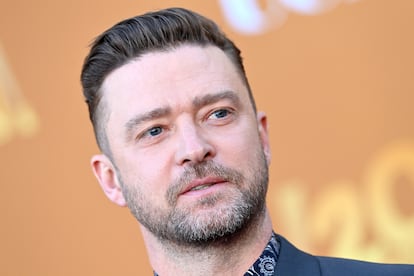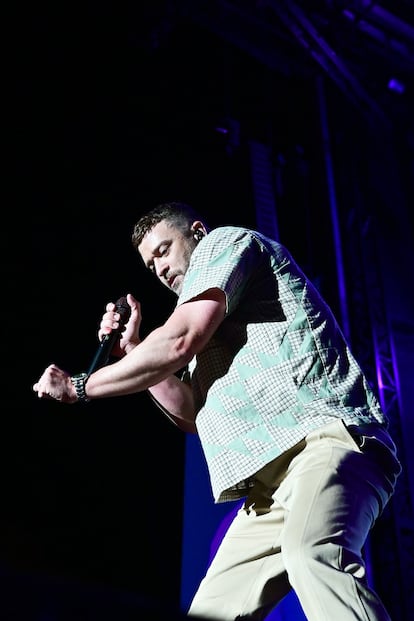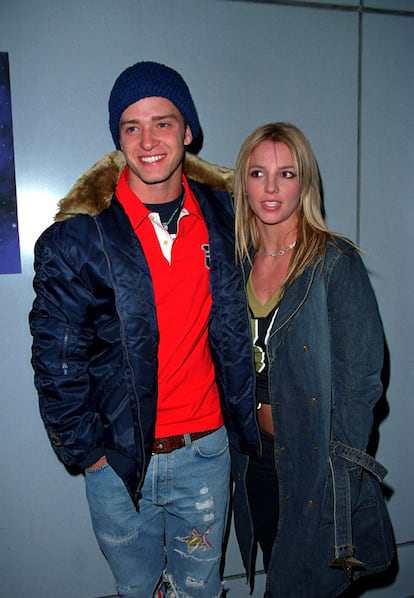Generation Z doesn’t like Justin Timberlake anymore: The ‘new king of pop’ apologized too late
Just 20 years ago, ‘Rolling Stone’ named him the genre’s ruling star. But a career full of macho attitudes and unfortunate comments is taking its toll

Twenty years ago, Rolling Stone magazine crowned Justin Timberlake “the new king of pop.” This summer, a video of the singer dancing at Washington’s Something in the Water festival accumulated millions of views on social networks, but not for the reasons he would like. Commenters called the star “creepy,” “hilarious” and “embarrassing.” “Justin Timberlake still thinking he has any swag left while wearing those Old Navy khakis on stage,” jeered one Twitter user. “This is the height of gentrification,” wrote another. When did Justin Timberlake, once the biggest star on the planet, the world’s best pop dancer and the coolest man in the entertainment industry, become a pop culture piñata? Timberlake has been stirring public opinion for 20 years. Now, all the backlash is hitting him at once.
Why does Justin Timberlake now move like me dancing to Justin Timberlake at the club? pic.twitter.com/bOVc8MPg7a
— Lee (@JustifyMyLee) June 19, 2022
Timberlake released his first solo album, Justified, in 2002 at the age of 21. The promotional campaign coincided with his breakup with Britney Spears. He used the Cry Me A River music video, which featured a lookalike of the pop singer, to make it clear that she had cheated on him. Timberlake revealed on two different radio shows that he had had sexual relations with Spears, despite the fact that during their relationship, both had proclaimed their intention to be virgins at marriage.
Timberlake continued talking about Spears over the years. In 2013, he referred to her in a Saturday Night Live sketch about his ancestors’ wishes for their descendants: “He’ll date a popular female singer. Publicly they’ll claim to be virgins, but privately, he’ll hit it.” At a 2007 concert, while Spears was in a rehabilitation center for her mental problems and addictions, he alluded to her more indirectly: during a performance of Cry Me A River, ending the song with the chorus of Amy Winehouse’s hit Rehab.
In 2004, Timberlake participated in the Super Bowl halftime show alongside Janet Jackson. At the end of the performance, he uncovered her breast for 9/16 of a second before an audience of 143 million viewers. More than 200,000 viewers complained to CBS. In the midst of the Iraq war, the so-called Nipplegate incident occupied ample space in the conservative media, which fueled the controversy that damaged Jackson’s career. Radio and television channels stopped broadcasting her, ABC canceled a movie about Lena Horne that she was going to star in and Disney World removed a statue of Mickey Mouse dressed as Jackson.

Timberlake, by contrast, suffered no consequences. The Grammys canceled Jackson’s planned appearance, but Timberlake did perform, winning two awards and using his speech to apologize. He didn’t mention his stage partner. At no time did Timberlake publicly defend, support or apologize to her. What he did do was criticize the singer’s interview with Oprah Winfrey, in which Jackson claimed to have felt betrayed by Timberlake. Many fans believe he insulted her on the song Give It To Me: “Could you speak up and stop the mumbling? I don’t think you’re getting clear. Sitting on the top it’s hard to hear you from way up here. I saw you trying to act cute on TV. Just let me clear the air. We missed you on the charts last week. Damn that’s right, you wasn’t there.” Give It To Me reached number one on the United States’ charts.
Timberlake’s album Future Sex/Love Sounds was the third best-selling album of 2006. Three of its songs went on to reach number one: Sexyback, My Love and What Goes Around Comes Around, which also attacks Spears.
His wedding to actress Jessica Biel in 2012 generated controversy. A video, orchestrated by one of his friends to be projected during the reception, was leaked in which several homeless people from Los Angeles congratulated Timberlake and expressed their regret at not being able to attend the event, which was held in Puglia (Italy) and cost €6 million. The friend in question paid €30 to each homeless person for their participation. That month, Shriners Children’s Hospital announced the end of its relationship with Timberlake.
The current of public opinion definitively turned against him until 2016. Grey’s Anatomy actor Jesse Williams gave a speech at the BET gala about the need to rebel against cultural appropriation: “We’re done watching and waiting while this invention called whiteness uses and abuses us, burying Black people out of sight and out of mind while extracting our culture, our dollars, our entertainment.” Timberlake reacted by tweeting “#inspired,” to which journalist Ernest Owens replied, “Does this mean you are going to stop appropriating our music and culture? And apologize to Janet.” “Oh, you sweet soul,” replied the singer. “The more you realize that we are the same, the more we can have a conversation. Bye.” Given the controversy, Timberlake deleted the tweet, but insisted that “we are all one…one human race.”

That exchange sparked a media conversation about cultural appropriation and the well-intentioned passivity of white celebrities. Timberlake has built his career drawing on Black aesthetics, musicians and culture. His sound has oscillated between R&B, hip hop, funk and soul, but for him, as Candance McDuffy wrote in Glamour, “Black culture is a lucrative disguise that he can remove as soon as it ceases to benefit him.” Or as Luria Freeman summed it up in Vibe, “Justin owes his voice to the black community, but he remains silent.”
In early 2018, Timberlake released his fourth album, Man Of The Woods. He traded his image as a neo-Sinatra heartthrob for flannel, jeans, and fur coats, finding himself in the wilderness of the Wild West (the singer has a ranch in Montana). Criticism raged against the project. “Justin Timberlake relaunches his brand, now as a white man,” The Outline headlined. “Montanans laughed at the notion that a multimillion-dollar home at a private ski resort, filled with other non-Montanans, would evoke ‘the Wild West’; others suggested that he’d watched The Revenant or listened to Bon Iver once and co-opted the signifiers,” observed Anne Helen Petersen on Buzzfeed.
Critics saw Justin Timberlake’s reinvention as another disguise. “Justin Timberlake hasn’t suddenly reclaimed his white masculinity for the first time with Man of the Woods. It’s been with him all along. It’s just that now it’s become impossible to ignore,” wrote Constance Grady for Vox.
The night Justin Timberlake performed at the 2018 Super Bowl halftime show, becoming the first person to take that stage three times, #JusticeForJanet was a trending topic on Twitter. While Jackson’s career remained in shambles 14 years after Nipplegate, Timberlake returned to the scene in style. In addition, many fans considered Prince’s appearance in a giant hologram yet another jab by Timberlake at Black culture and an act of disrespect towards Prince, who had stipulated that he did not wish to appear in holograms because he considered them demonic. The press considered it one of the least memorable intermissions of the Super Bowl.
At the beginning of last year, the documentary series The New York Times Presents devoted an episode to Britney Spears’ career and another to the collapse of Janet Jackson’s career after the Super Bowl. In both, perhaps the two most emblematic episodes of misogyny in 2000s pop culture, Timberlake played an antagonistic role. And in both he went unpunished. “Timberlake’s shine has worn off, leaving behind an uncomfortable tale of a man who enjoyed continued success at the expense of other people’s losses,” wrote journalist Chelsea McLaughlin.
Look, it took a scathing documentary to get Justin Timberlake to issue a "heartfelt apology" (likely drafted by his publicist) to Britney Spears & Janet Jackson. He spent nearly 20yrs benefiting from cultural appropriation & misogyny. He's a jerk - and his apology comes too late.
— Elgin Charles (@ElginCharles) February 13, 2021
Last month, Rolling Stone, the same magazine that two decades ago proclaimed him the new king of pop, analyzed Timberlake’s viral dance in Washington. It blamed Generation Z for the singer’s new status. “Zoomers, particularly those on TikTok, are really good at making previously lauded white men seem remarkably uncool. This is a curse that has now befallen Justin Timberlake, the once pop prince.” But singer’s decline in popularity goes beyond social media run-ins. “The new reckoning around him feels like a cultural exorcism, a chance to use the boy band vessel to purge ourselves of the evils he now represents to many,” writes Maria Sherman at Slate.com. “Timberlake has become the perfect emblem of a bygone era that rewarded guys exactly like him – until it didn’t.”
Tu suscripción se está usando en otro dispositivo
¿Quieres añadir otro usuario a tu suscripción?
Si continúas leyendo en este dispositivo, no se podrá leer en el otro.
FlechaTu suscripción se está usando en otro dispositivo y solo puedes acceder a EL PAÍS desde un dispositivo a la vez.
Si quieres compartir tu cuenta, cambia tu suscripción a la modalidad Premium, así podrás añadir otro usuario. Cada uno accederá con su propia cuenta de email, lo que os permitirá personalizar vuestra experiencia en EL PAÍS.
¿Tienes una suscripción de empresa? Accede aquí para contratar más cuentas.
En el caso de no saber quién está usando tu cuenta, te recomendamos cambiar tu contraseña aquí.
Si decides continuar compartiendo tu cuenta, este mensaje se mostrará en tu dispositivo y en el de la otra persona que está usando tu cuenta de forma indefinida, afectando a tu experiencia de lectura. Puedes consultar aquí los términos y condiciones de la suscripción digital.








































